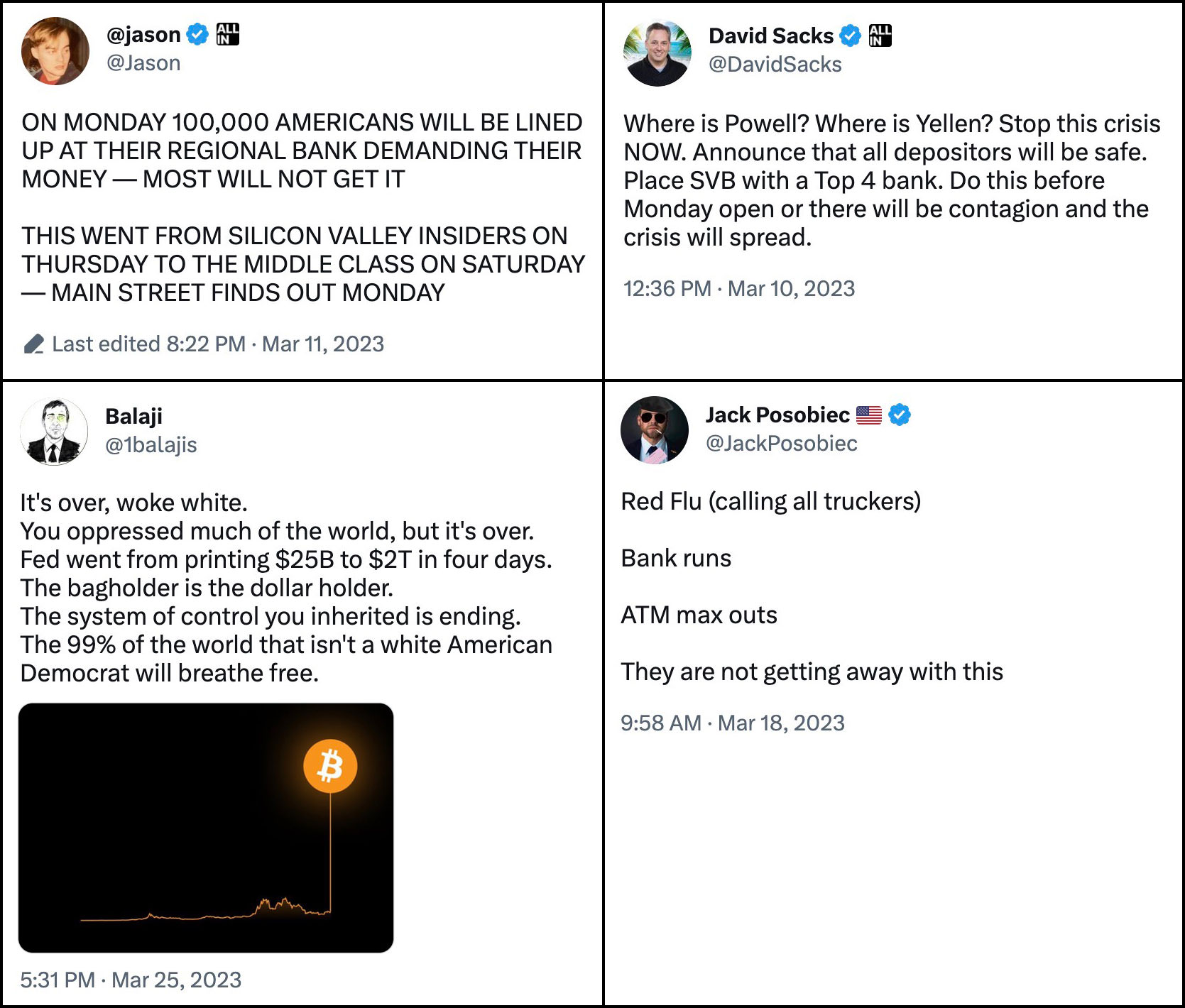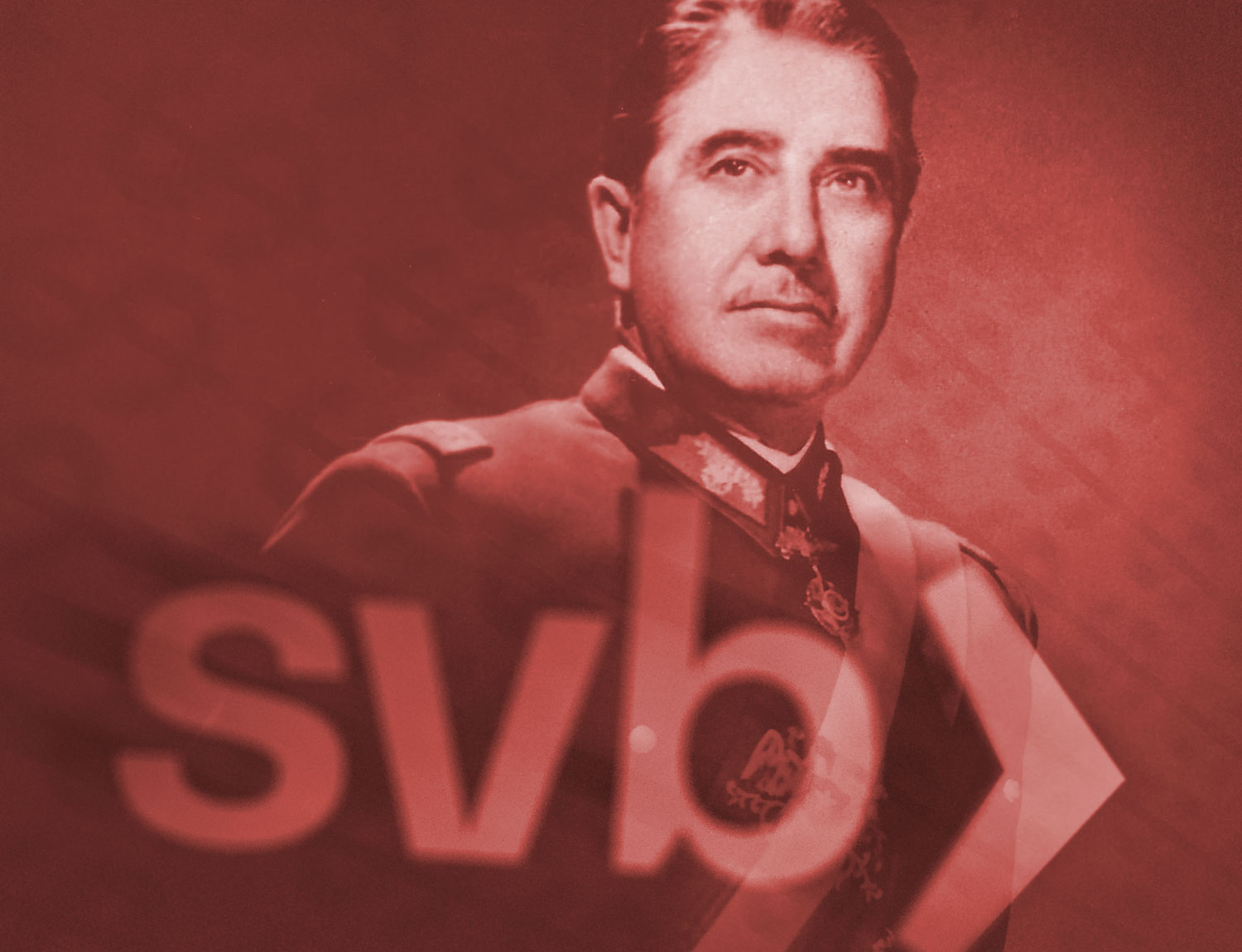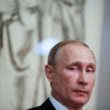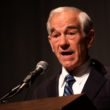The recent collapse of Silicon Valley Bank demonstrated in clear terms that financial reality is a shared hallucination. And financial reality, a useful social construct, goes a long way to shaping our physical reality. For the businesses threatened by a potential meltdown of the bank, a cashflow freeze meant the difference between real people getting paychecks or not, and posed an existential risk.
Perhaps most revealing about the SVB episode was the degree to which prominent venture capitalists seemed to cheer the prospect of a systemic collapse. Many assert that prominent venture capitalist Peter Thiel sparked the bank run by withdrawing his funds and advising his portfolio companies to do the same. David Sacks and Jason Calacanis caused alarm with paranoid, prepper-style tweets suggesting imminent doom. And Balaji Srinavasan has said in recent days that Weimar-style hyperinflation is imminent, the dollar will collapse, and the days are numbered for “woke white oppressors.” If banking reality is shaped by our thoughts, these folks have been pushing very negative ones.
Regular readers of The Wide Angle know that I’ve been following these players and this set of topics for some time — in particular my June 2022 essay “Paranoia on Parade” hypothesizes that this kind of social media-induced attack on the financial markets (specifically against the dollar, the banks, and the stock market) was being beta-tested and prepared. The goal? Disrupt the dollar as the world’s reserve currency in favor of crypto and asset-backed currencies. This week, Srinavasan just called for Bitcoin to hit $1 million in the next 90 days and predicted the demise of the dollar. Bitcoin is at $28,274 as of this writing; most people believe Srinavasan’s projection is hyperbole and alarmism and accuse him of conducting a “pump and dump” scam.
In 2016, the Russian economist Sergey Glazyev wrote a book, “The Last World War: The U.S. to Move and Lose,” which outlines much of the current Ukraine war strategy. It is both a work of propaganda intended to undermine and demoralize Ukraine by attacking its legitimacy, smearing it with Nazi associations, and implying it is merely a U.S. puppet state. But that much is boilerplate and de rigeur. More interesting is his discussion of the financial impacts this war will have on the dollar and how the intent of this strategy is to drive a wedge between the BRICS countries and the West.
Last month, I wrote about how Glazyev was influenced in part by Lyndon LaRouche and his concept of a “Bretton Woods III” system of asset-backed currencies to upend the dollar, fiat currencies, and central banks. But it seems Glazyev had another unlikely influence as well: Gen. Augusto Pinochet, the Chilean dictator who displaced the Soviet-backed socialist leader Salvador Allende through a CIA-led coup in 1973.
An astute reader alerted me to the work of Tobias Rupprecht, a British historian, who has explored this topic — unknown to most Western analysts. During the 1970’s and 80’s, as the Soviet Union was drifting towards its demise, a contrarian faction emerged that had grown tired of supporting a sprawling network of foreign “revolutions” with the price of domestic austerity. To them, the Allende regime was a failure: high inflation and unemployment was proof positive that Soviet backing alone was insufficient to ensure success. Pinochet, by contrast, quickly (and brutally) took control of the situation, smashed inflation, and created an “economic miracle” with the help of the “Chicago Boys,” economists led famously by Milton Friedman and his acolytes from the University of Chicago.
Of course, the Pinochet coup was backed by the CIA and free-market zealots in the United States. The ubiquitous Seymour Hersh wrote in 1974 for the New York Times, “C.I.A. Is Linked to Trucker Strikes that Beset Allende,” describing the series of supply chain attacks that brought the country to its knees, and how this was funded by money from the CIA. That trucker strike bled into the United States months later — in December 1973, American truckers ostensibly protesting gas prices launched a copycat strike that offered harbingers of more recent MAGA-linked trucker convoys.
As the Soviet Union was collapsing, enthusiasm for Pinochet reached a fever pitch among a circle of Russian intellectuals. Sensing opportunity, they saw a chance to replicate his successes at privatizing another formerly socialist economy emerging in the “new” Russia. Vitaly Nashul, an economist who developed the first draft of a plan to privatize the Russian economy using vouchers, figured it was time to stop talking and learn first-hand. So in April 1991, he organized a “neoliberal pilgrimage” to Chile to witness the miracle for themselves. And to meet their strongman hero, El Jefe.
Among the delegates was Sergey Glazyev, who was also one of four who, along with Nashul, was granted a private audience with Pinochet. According to Rupprecht, they recalled, “Pinochet looked like Stalin in those old films, benign and austere.” Author Naomi Klein, in her 2007 book “Shock Doctrine,” was among the first Western authors to note the admiration for Pinochet inside Russia, which spanned the intelligentsia and everyday citizens.
Glazyev, for his part, later hedged his outward affiliations by also professing admiration for Cuban dictator Fidel Castro (with whom he also met), but overwhelmingly pursued the reforms promoted by the clique around Yegor Gaidar, who led Russia’s shock therapy program. And Glazyev became a longtime ally of Vladimir Putin, who was cast in the “strongman” role first modeled by Pinochet.
Columbia University economist Jeffrey Sachs, perhaps the most prominent Western personality associated with the “shock therapy” concept, was also famously involved in privatization efforts in Bolivia, Poland, and Russia. He has become a persistent mouthpiece for Russian propaganda, going so far as to appear as a guest of Vladimir Solovyov, perhaps the Russian state television equivalent of Alex Jones. He’s also been hanging out with Victor Orban and spreading Sy Hersh’s contested story about NATO bombing the Nordstream 2 pipeline.

A sampling of recent messaging: venture capitalists Jason Calacanis, David Sacks, and Balaji Srinavasan; pro-Putin propagandist Jack Posobiec.
For years, my analyst peers and I have picked up pro-Pinochet messaging in Russian propaganda. Now we better understand why. As tensions continue to rise, we expect an increasingly forceful effort to spark financial collapse — with “shock therapy” as the proposed solution. Indeed, Putin’s most prominent US mouthpieces are already calling for trucker strikes, sick-outs and bank runs in response to a possible Trump indictment. Senator Elizabeth Warren has called for a Congressional inquiry into bank runs, as Credit Suisse and UBS celebrate a shotgun wedding.
The upcoming fight over the debt ceiling, likely to play out in April and May, remains the main event. Gold is back up to new highs this week after a temporary lull. It’s unclear whether US policymakers understand how the debt ceiling fight is tied to the Glazyev-Pinochet “shock therapy” strategy — and the echoes of the September 11, 1973 Pinochet coup. But our future reality depends on their figuring it out.
———
Suggested Reading:
Rupprecht, Tobias. “Formula Pinochet. Chilean Lessons for Russian Liberal Reformers during the Soviet Collapse, 1970–2000”, 2015.
Glazyev, Sergei. “The Last World War: The US to Move and Lose”, 2016.
Klein, Naomi. “Shock Doctrine: The Rise of Disaster Capitalism”, 2007.
Dave Troy is an investigative journalist focused on exposing threats to democracy. Based in Baltimore, his background as a technologist with an interest in studying online extremism affords him a unique perspective. His work has appeared at MoMA in New York, and he is a fellow with New America Foundation’s Future Frontlines. Dave writes regularly about information warfare, history, and politics. He is the host of the podcast Dave Troy Presents, and speaks regularly at conferences on disinformation, extremism, and information warfare. Contact information is available at davetroy.com.







0 Comments